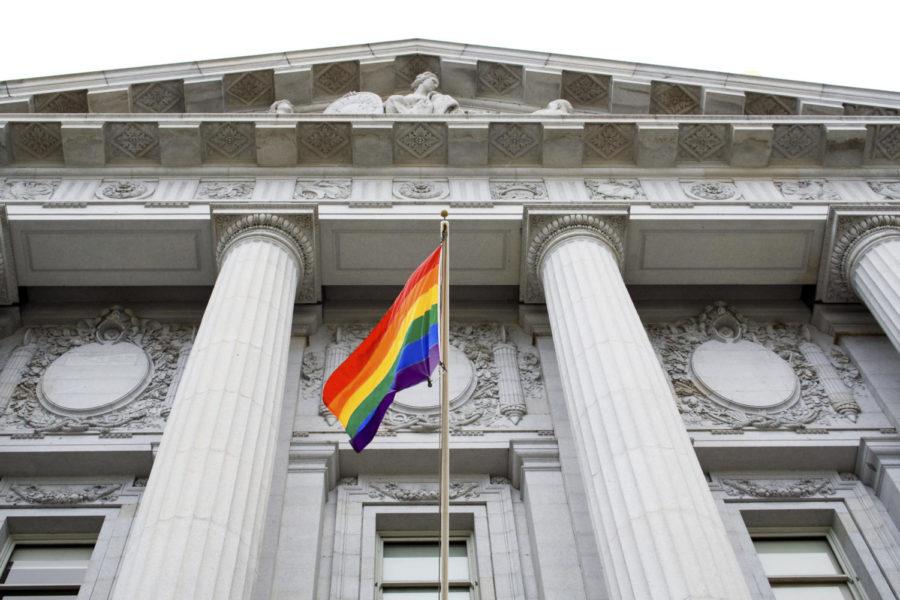Snyder: Lawmakers must move forward on same-sex marriages, LGBT rights
With states like Alabama and Kansas pushing back against the tide of equality, columnist Snyder argues that the future of equality has already been decided.
February 13, 2015
The march toward gay rights and LGBT equality in our country saw monumental successes in 2014 when the total number of states removing their same-sex marriage bans ascended to 35. This year got off to an even more promising start when Alabama had its ban overturned by a court decision and its request for a stay in that judgment denied by a 7-2 decision from the Supreme Court.
Alabama Supreme Court Chief Justice Roy Moore, who thinks that he knows better than the people who are charged with the job of telling him when he is wrong, decided to take matters into his own hands by telling courts not to issue marriage licenses to same-sex couples, leaving people waiting outside of closed offices, denied the right they had been legally guaranteed.
Moore has made a habit of ignoring federal rulings and was removed from the Alabama Supreme Court for a different act of disobedience, but the seemingly socially illiterate voters of Alabama thought it was necessary to put him back in his position of power in 2012. Moore’s argument against marriage equality is based entirely on his religious ideals as he wishes to uphold the “divine” definition of marriage, which is not only a disgusting abuse of power from a judicial official, but is also blatantly unconstitutional.
However, that was not even the most discouraging legal action taken against civil rights in the past week. We have the state of Kansas to thank for that.
Kansas Gov. Sam Brownback looked to his friends in Alabama and apparently decided that he could take the bigotry even one step further, and he didn’t fail. Brownback struck down the state laws that prohibited discrimination against the LGBT community in the workplace. So just remember that if you work in Kansas, it isn’t about how well you perform your duties as an employee. It’s about whom you share your bed with.
The saying, “those who do not learn their history are doomed to repeat it,” must not be the preferred adage of the Brownback administration because such laws draw direct comparisons to a time when race or religious affiliation was a key factor in the hiring process. So to the LGBT community in Kansas, let me extend an invitation to the state of Iowa. We’re nice to everybody.
In the past, when speaking on this subject, I have been called arrogant for believing that I, and the millions of others like me, stand on the correct side of history. Arrogance could be defined as self-assurance of one’s own victory or an unrelenting belief in one’s own correctness. That being the case, I am indeed arrogant in this regard. But tell me, which of the following instances of arrogance are worse — The “arrogance” of Americans who believe they should have the exact same marriage rights and legal protections as their fellow citizens, or the arrogance of those who deny them based on religious sentiment and a moral assurance that their way of life is the only correct and acceptable way to behave?
To apply a historical civil rights perspective to the same debate, was it arrogance when black students attempted to attend the school that the federal government said was open to them, or was it arrogance when the governor of Alabama stood in front of those students and would not let them pass because of a preconceived notion of his own moral righteousness? To answer that question, only one of those two characters made an apology for their actions and admitted their faults.
I do not argue these issues for my own benefit, but because I feel that I know what is right. The overwhelming majority of young people are in favor of allowing same-sex marriage, regardless of their political affiliation. According to a 2014 poll from the Pew Research Center, 61 percent of Republicans ages 18 to 29 are in favor of same-sex marriage. While this total is lower than that of Democrats or Independents, it still represents a growing generational acceptance.
The reason that opposition is found in states like Alabama and Kansas is largely based on the fact that sentiment of the younger generations are still being drowned by those who grew up in a time when there was only one way to present yourself socially and if you were different, you kept it to yourself.
The sentiment for equality grows stronger every year, as seen through polling numbers, and changes to state and federal laws. The increasingly isolated pockets of resistance to be found in our country will eventually be nothing but a memory of a time that has passed. Just as we look back at the struggle for women’s rights and the fight for racial equality in the South and say, “I’m glad I didn’t live in a time of such ignorance,” future generations should look back at this new civil rights movement and express that same gratitude.







